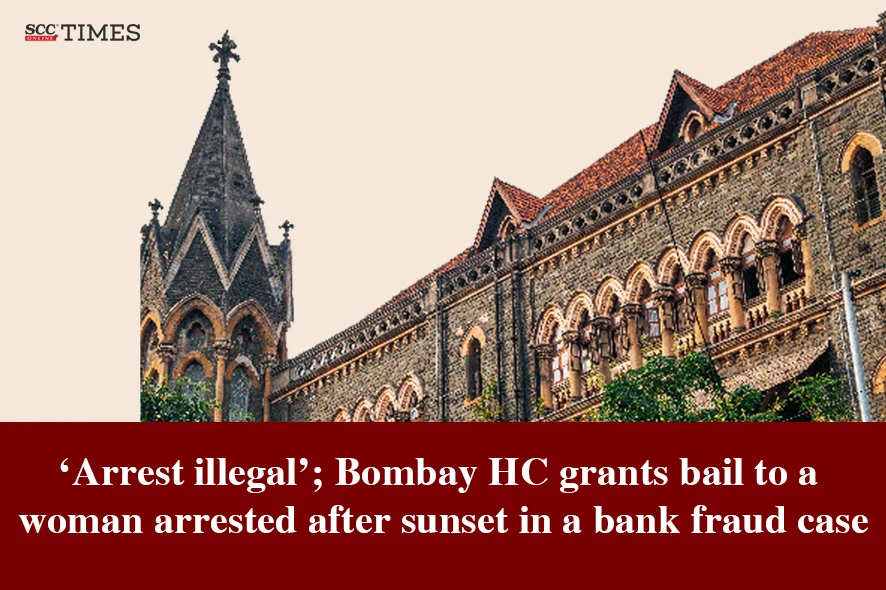Bombay High Court: The present bail application was filed by the applicant-accused who was accused of facilitating a bank fraud by sanctioning loans and was charged under Sections 109, 120-B, 406, 409, 417, 420, 421, 424, 467, 468, 471 and 477-A of the Penal Code, 1860 (‘IPC’) and under Section 3 of the Maharashtra Protection of Interest of Depositors (in Financial Establishments) Act, 1999. A Single Judge Bench of Urmila Joshi Phalke, J. noted that there were inconsistencies in the time of arrest and the grounds of arrest were also not communicated to the friends or relatives of the accused and therefore granted her bail. The Court stated that the accused was arrested after sunset without prior permission and grounds of arrest were also not communicated to the friends/relatives of the accused, therefore her arrest was illegal.
Background:
The accused was the Chief Executive Officer of ‘Babaji Date Mahila Sahakari Bank Limited, Yavatmal’ (the ‘Bank’). The audit of the Bank was conducted, and it revealed that there were various illegalities and therefore, a Special Auditor was appointed. Later, it was revealed that loans were disbursed in the name of the accused’s husband and her relatives without sanction from the Board of Directors. Thus, she was instrumental in the loss of Rs 1.88 crore and during her tenure, a total fraud of around Rs 242 crore was committed. Consequently, she was arrested.
The accused submitted that the loans outstanding against her husband were already repaid and for the loans to the relatives, where her husband stood the guarantor, the house in the name of the husband’s mother was mortgaged. Apart from the allegations about the loans, no other allegation was levelled to show her direct involvement. It was further submitted that the grounds of arrest were not communicated to her, and the said arrest was made after sunset which, in view of Section 46 of the Criminal Procedure Code, 1973 (‘CrPC’), was illegal.
The respondent contended that the accused was associated with supervising and disbursement of loans and verification of loan proposals. It was submitted that the loan accounts in the names of her relatives were in fact utilized by her husband. The loan proposals and the relevant documents were not available in the bank or with the liquidator. The prima facie involvement of the accused in the crime was thus shown by the statements of witnesses and bank employees, audit report, and the relevant documents. Thus, the bail application was prayed to be rejected considering the grave nature of the offence, wherein approximately 37000 investors were involved.
Analysis and Decision:
The Court noted that the husband mortgaged the property in respect of the relatives’ loans, but neither was a charge created on the said property, nor was a mortgage deed executed. Also, there were no records of the said loans available which were required to be preserved for eight years as per the Reserve Bank of India’s guidelines. The statements of witnesses and the bank employees also disclosed the involvement of the accused in the alleged misappropriation.
The accused alleged that the notice as to the arrest mentioned 22:39 hours as the time of arrest, but other documents showed the timing of arrest as 17:58 hours. However, the respondent stated that the arrest form and the notice under Section 35(2) BNSS showed the timing of arrest as 5:30 p.m., thus submitting that the arrest was not made after sunset. The Court observed that there was an inconsistent record as to the arrest of the accused and after referring to the 135th and 154th Law Commission Report as well as Section 46(4) CrPC, held that since her arrest was made after sunset, it was illegal.
The Court emphasized that the guarantee of ‘life and liberty’ as enshrined under Article 21 of the Constitution could not be denied even to an accused who was in custody and surely not to a suspect who was sought to be converted to an accused and subsequently, a convict on trial. The CrPC described the manner and the extent to which a person could be denuded of his liberty and, therefore, needed strict compliance. Any violation of the prescribed procedure in the matter of arrest could, therefore, be declared illegal.
The Court relied on the Supreme Court’s decision in Vihaan Kumar v. State of Haryana, (2025) 5 SCC 799, wherein it was laid down that mere information of arrest would not amount to furnishing grounds of arrest and observed that the grounds of arrest were not communicated to the friends or relatives of the accused so as to arrange her defence and therefore, such arrest was illegal.
The Court also referred to Y.S. Jagan Mohan Reddy v. CBI, (2013) 7 SCC 439, and observed that the accused was involved in an economic offence and while granting bail in such offences, the Court had to take into consideration nature of accusations, nature of evidence in support thereof, and the severity of the punishment.
Thus, after considering the above facts and circumstances, the Court released the accused on bail upon her executing a P.R. Bond in the sum of Rs 1 lac with two solvent sureties of the like amount.
[Sujata v. State of Maharashtra, 2025 SCC OnLine Bom 2634, decided on 11-7-2025]
Advocates who appeared in this case :
For the Applicant: S.V. Manohar, Senior Counsel assisted by Atharva Manohar, Advocate.
For the Respondent: D.V. Chauhan, Public Prosecutor (Senior Counsel) assisted by Anant Ghongre, Addl.P.P. for the State.





